Time Stands Still
A chance meeting conjures up memories of Rwanda and our California migration story.
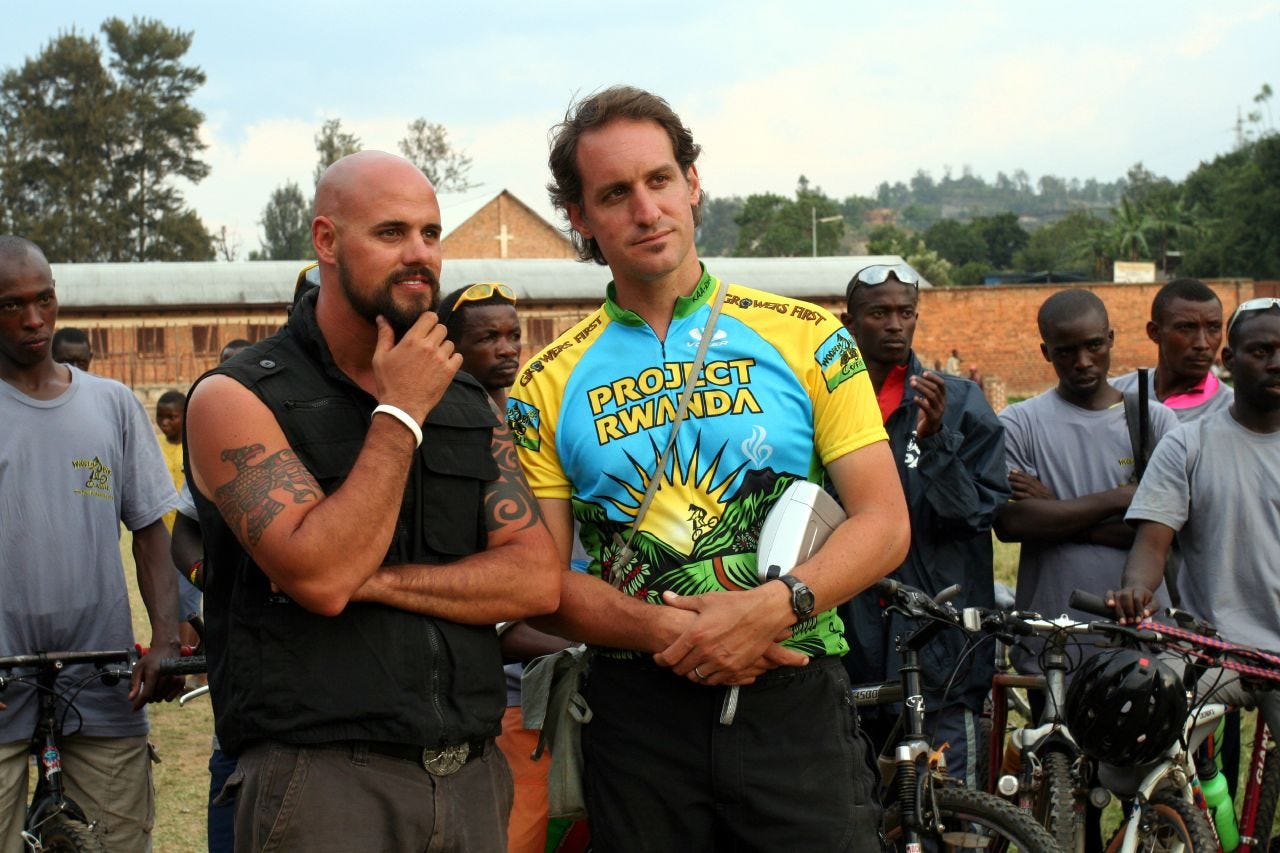
Last Saturday morning I was washing the side cases from my Moto Guzzi Quota 1100ES. After 9,000 glorious miles of ownership it was time to find a new rider and home for the Italian tractor. As the suds were getting sprayed down the driveway an older couple walked by, both them and their little dog unfamiliar to me as the day’s heat was slowly building.
“Good morning,” I said, hose in hand as I washed off my feet. Phil was meeting at our place in an hour or so for a ride to the coast to escape the forecasted 90-plus degree heat. It was our maiden voyage on the 2007 Triumph Tiger 1050 we purchased from George Smith in Martinez a few days prior, and Jean was excited to get back on a proper two-up sport touring bike after we sold our trusty BMW R 1150 RT several months ago.
“Hey, that’s a Moto Guzzi,” the gentleman said as he doubled back toward me. “Haven’t seen that model before. I’m more of a car guy, but the Guzzis always stand out to me.”
As we were making small talk, Jean rolled her lugged steel fixed gear bicycle toward the street on her way to the local Safeway and chatted up his wife, who turned out to be the sister of Tom Ritchey, the prolific bicycle industry personality who grew up in nearby Palo Alto. Tom was an early mountain bike innovator alongside Gary Fisher, Joe Breeze and other Bay Area luminaries, and built a custom steel bicycle for his sister years ago.
Bicycles Before Motorcycles
“Your brother is the reason we’re living here,” I told her with a smile. In December 2005, Tom invited me to tour Rwanda by mountain bike alongside a few other Americans. Some business people were interested in developing infrastructure in Rwanda, a landlocked African country the size of Massachusetts known as the land of a thousand hills due to its lumpy terrain.
The entire country is at a high altitude: the lowest point is the Rusizi River at 3,117 feet above sea level. At 14,787 feet, Mount Karisimbi is the highest of the eight major mountains of the mountain range, which is a part of Albertine Rift, the western branch of the East African Rift. Karisimbi is flanked by Mikeno to the north, Bisoke to the east and Nyiragongo to the west, on the other side of the Rift Valley.
Eleven-plus years removed from the atrocious genocide, Rwanda was also suffering mightily, a staggering stigma keeping tourism and development at an all-time low. Tom was asked to explore the country by mountain bike and see what opportunities might present themselves. He invited me as his comic relief, scribe and people connector.
At the time, Jean and I had our own bicycle brand and boutique shop in Dayton, Ohio, home of the Wright Brothers. We had just moved our family, home and business from Oakwood to Springboro, a growing town known for its national historic district, where our home and shop was located. The house was built in 1828, with three capped off tunnels from the Underground Railroad in the basement that provided much discussion, and the barn – where we ran the bicycle shop – was built in 1850. We were happy, and the future looked bright.
When Tom called me in October 2005 about visiting Rwanda, I hesitated. He’s all about adventure, travel and making memories in exotic places, but he was wealthy and had other people running his business. I, on the other hand, ran Cycles Gaansari with Jean and one other employee. Jean and I discussed it, and after doing my own research on Rwanda, let Tom know I was willing to go.
“If you’re buyin’ I’m flyin’” were my exact words. It was a $2,500 round trip ticket, after all. Ten hours from Dayton to Amsterdam (where I missed my connection to Brussels), then another 10 to Kigali, Rwanda’s capital.
Coffee + Bikes + Racing
We covered plenty of ground during our 10 days in Rwanda. Locals were a bit taken aback by seeing a handful of muzungus (white people) riding fancy mountain bikes through the jungle, on highways and through their villages. The riding was epic, and the people were overjoyed. It was humbling, overwhelming and scary all at once (soldiers with submachine guns were posted all around Kigali, while hunters and workers carried machetes everywhere else).
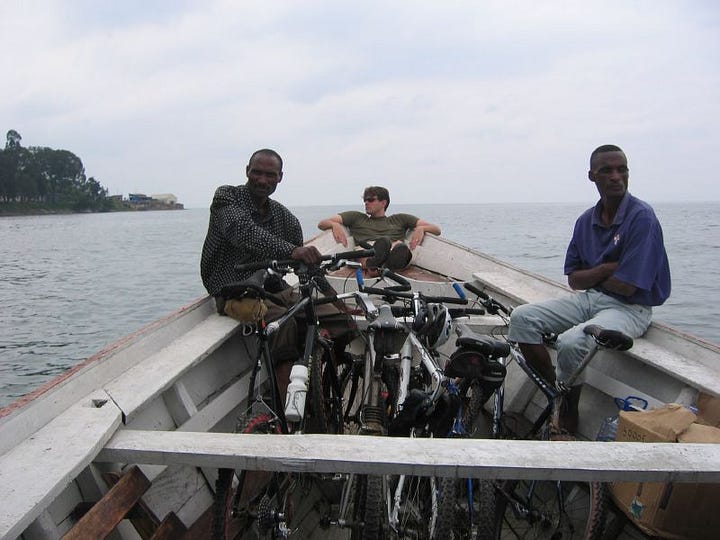
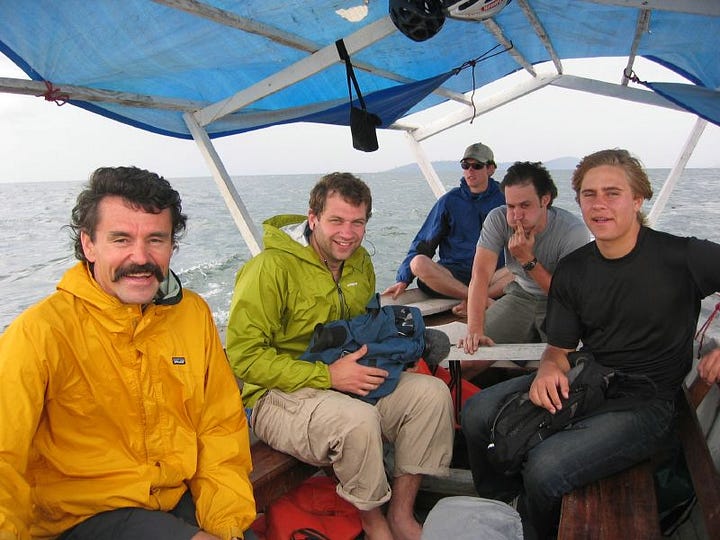
Rwanda also has many lakes, the largest being Lake Kivu, which we crossed with our bikes in a small boat. This lake occupies the floor of the Albertine Rift along most of the length of Rwanda's western border, and with a maximum depth of 1,575 feet, it’s one of the twenty deepest lakes in the world.
Subsistence crops grown in Rwanda include green bananas (which occupy more than a third of the country's farmland), potatoes, beans, sweet potatoes, cassava, wheat and maize. Rwanda produced 2.6 million tons of banana in 2019, its largest cash crop. Coffee and tea are also major cash crops for export, with the high altitudes, steep slopes and volcanic soils providing favorable conditions.
On our long rides through the country, it was common for boys to ride alongside on dilapidated singlespeed bikes from China or India, often wearing fake Crocs. They had no trouble keeping up on the climbs, and did most of the talking and laughing while we sucked in as much oxygen as possible at such extreme elevations.
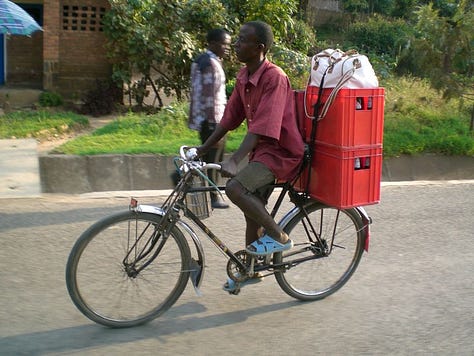


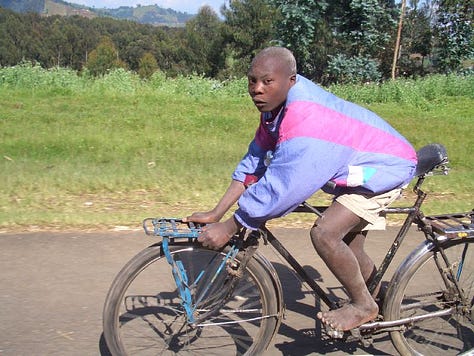

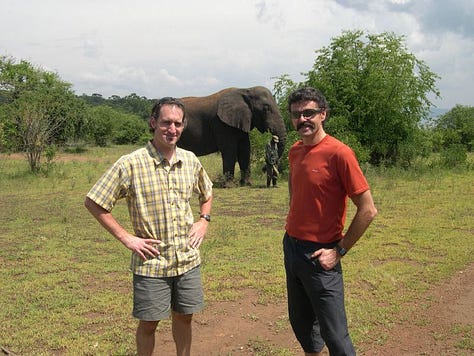
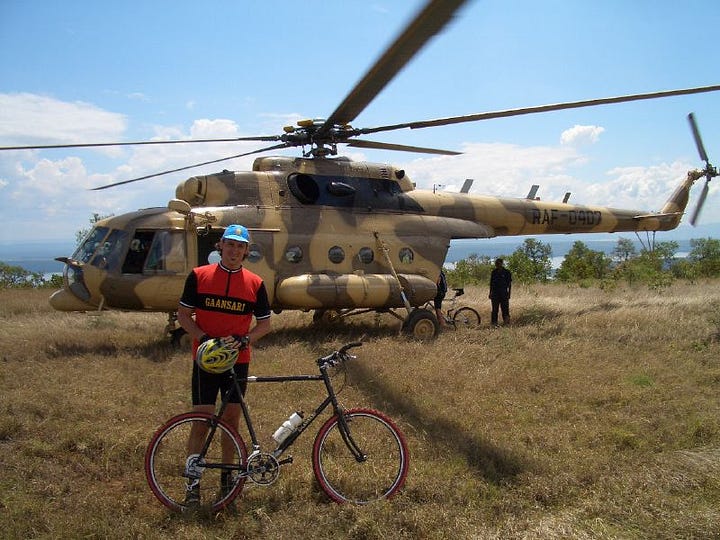
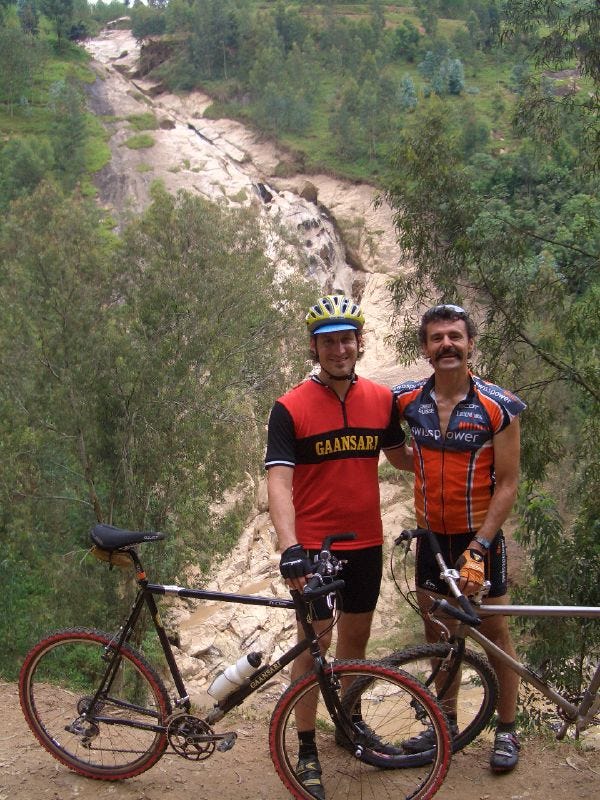
A few months after we returned to the United States, Tom and I convened at the James House in Carmel Highlands south of Monterey. The house was owned by Joe Ritchie (and bought by Brad Pitt for $40 million last year, months after Ritchie passed away), one of the American businessmen behind our venture. We decided to start a nonprofit called Project Rwanda with the aim of bolstering the country’s profile through bicycle racing (objectives: participation in the Summer Olympics, world championships, Tour de France and other major races) and small business support (reports have established that more than 400,000 Rwandans make their living from coffee plantation).

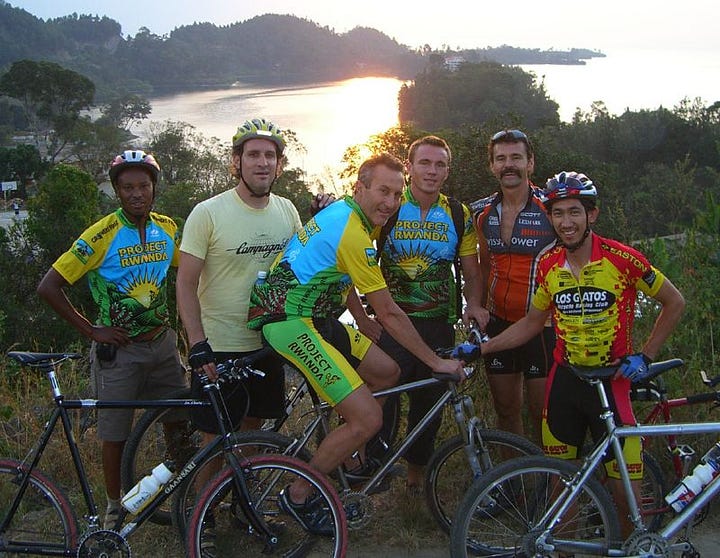
We hired Jonathan Boyer – the first American to race the Tour de France and a friend of Tom’s from their teen years – to relocate to Africa and run the Rwandan Cycle Academy. Tom and I also designed and sourced a coffee cherry-hauling cargo bike to sell to plantation co-ops at cost, because coffee cherry-picking families get paid a premium to deliver fresh product to the washing stations, and with Rwanda’s roads near impassable by vehicular means, it was often done on foot, which took 10 times longer.
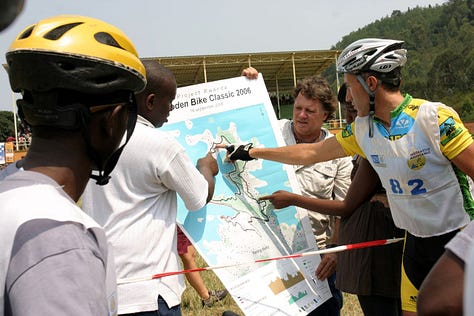


In September 2006, we returned to Rwanda to host the first Wooden Bike Classic, a mountain bike race to encourage young athletes to participate. The winner was Adrien Niyonshuti, who went on to a stellar professional career that included finishing the 2012 London Olympics mountain bike race. Adrien rode professionally for Team Dimension Data from 2009 to 2017. In 2021, he worked as a directeur sportif for UCI Continental team Skol Adrien Cycling Academy. In 2023, he will be leading the Benin National Cycling team to prepare for the UCI Championships to be held on the continent in 2025.
By 2007, nearly 2,000 Project Rwanda coffee-hauling cargo bikes were delivered. Jonathan established the cycling academy and brought his young team to race in the U.S.
Team Rwanda has been the subject of a book, Land of Second Chances: The Impossible Rise of Rwanda's Cycling Team and a film, Rising from Ashes. I witnessed the foundation being laid first hand. Tom was so focused on Project Rwanda that he convinced me to pull up stakes and relocate my family to northern California in late May 2006. Many have compared Tom to Steve Jobs, another Bay Area visionary: horse blinders to everyone around him, laser-like concentration on the big picture, a mix of Asperger’s and dyslexia with a touch of ADHD. No intentional malice on their part, mind you, but once you become less useful to them, sadly, you’re no longer needed.
I was grateful to play my part in Project Rwanda, and after 17 years never second guessed the decision to make California our new home. Motorcycles became our focus 10 years ago, and the people we’ve met and the places we’ve seen on different two wheels are equally memorable.
Where’s Tom?
And wouldn’t you know it, after not seeing Tom for several years, last Saturday we passed him riding his Ritchey bicycle up nearby State Route 9 as Jean, Phil and I motoed past on our way to the Pacific Ocean.
Time stood still for a hot minute.




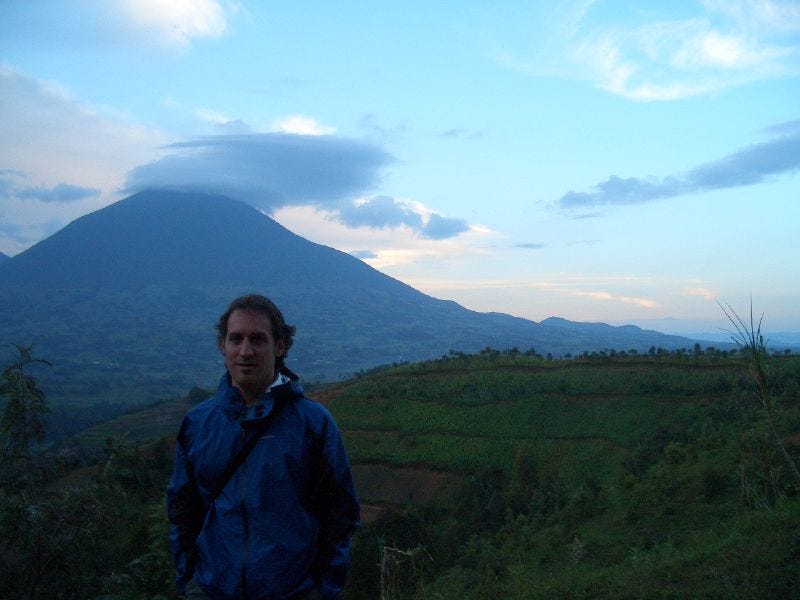
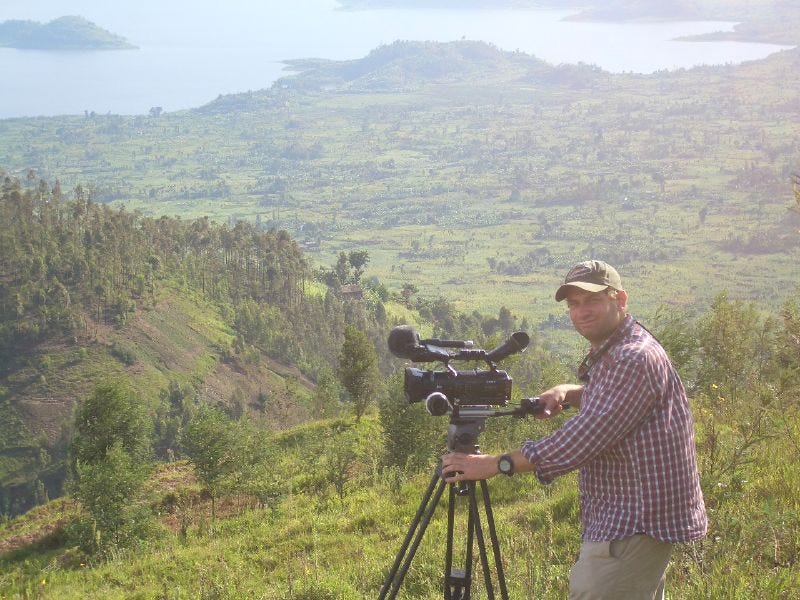
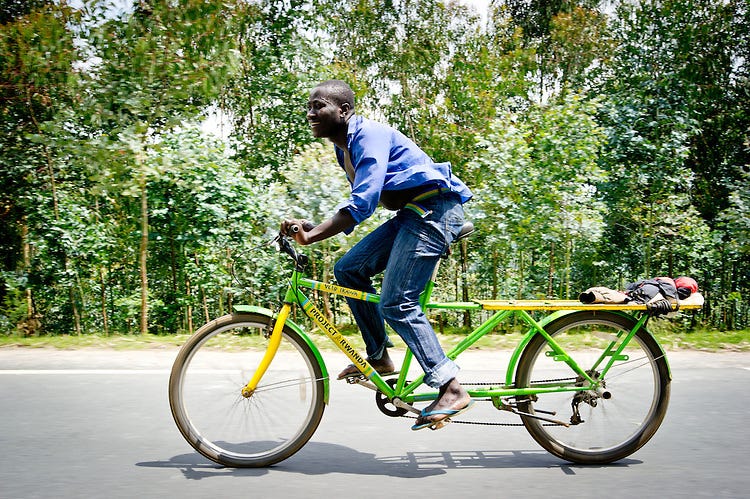
Such an amazing story! I came to your podcast and blog for Zahn and stayed for all of the incredible interviews and stories you have to share, I’m learning so much & I’m glad I found you. My husband and I are “motorcycle-adjacent” —dreaming about bikes and watching lots of bike-related content like Itchy Boots. Someday we may take the plunge!
Your stories have a way of weaving together small touches of humanity across such a diversity of peoples and locations. It's fascinating how you tie it all together.